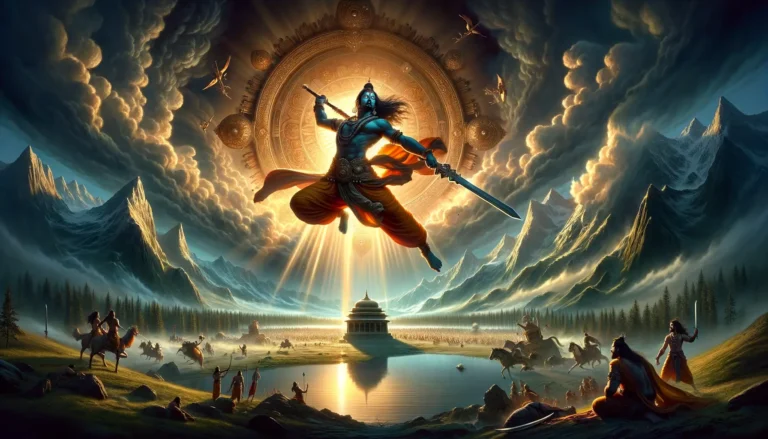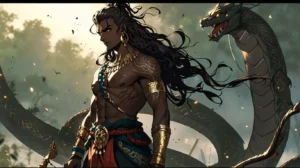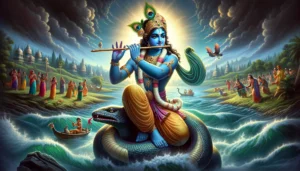Ashwatthama is a powerful warrior from the ancient Indian epic, the Mahabharata. He is known for his bravery and loyalty, but his story highlights the serious consequences of seeking revenge. As the son of Dronacharya, he was an exceptional fighter who supported the Kauravas in the great Kurukshetra War. Although he was incredibly skilled and dedicated, the decisions he made after the war caused him to be cursed to wander forever.
The Fateful Decision: The Unleashing of the Brahmastra
In the aftermath of the great battle of Kurukshetra, Ashwatthama was consumed by grief and a deep-seated desire for vengeance. The war had claimed the lives of his comrades and allies, leaving him in a state of despair. Driven by this intense desire for retribution, Ashwatthama made a decision that would forever alter his fate. He chose to deploy the Brahmastra, a divine weapon of immense power, against the camp of the Pandavas. The use of such a weapon was forbidden against unarmed foes and civilians due to its catastrophic potential.
It was an act of desperation, a deviation from the righteous path of warfare, aimed at inflicting maximum damage on the enemy. However, this decision was not merely a tactical one; it was a moral transgression that resulted in widespread destruction, including harm to innocents and even an unborn child within the Pandavas’ lineage. This recklessness marked a turning point in Ashwatthama’s life, setting the stage for his tragic downfall.
The Curse of Immortality: A Life of Endless Wandering
Witnessing the catastrophic fallout of Ashwatthama’s action, Krishna, a key figure in the Mahabharata known for his wisdom and divinity, decided to intervene. In response to the indiscriminate violence unleashed by Ashwatthama, Krishna bestowed upon him a unique and severe punishment: immortality.
This immortality, however, was far from a blessing. It was a curse meant to make Ashwatthama eternally suffer for his actions. Krishna condemned him to wander the Earth without respite, bearing a wound on his forehead that would never heal as a perpetual reminder of his misdeeds. This curse effectively stripped Ashwatthama of any semblance of honor or dignity, dooming him to a life of solitude, pain, and endless regret. Unlike the typical aspirations for eternal life, Ashwatthama’s immortality was a burden, a constant punishment that underscored the gravity of his actions and the inescapable consequences of moral deviation.
Why Ashwatthama Remains Alive
Ashwatthama’s continued existence is a poignant reminder of the cost of impulsive actions and the importance of adhering to righteousness. His story is a reflection on the nature of justice and the enduring impact of our choices. Immortality, often coveted, becomes his curse, illustrating that eternal life without peace or purpose is a harsh punishment indeed.
Lessons from ashwatthama’s Story
The saga of Ashwatthama highlights several vital lessons – the importance of self-control, the repercussions of our actions, and the complex nature of justice. It prompts us to consider the weight of our decisions and the potential fallout from our actions, especially when driven by negative emotions like anger or a desire for revenge.
A Reflection on Duty and Morality
Ashwatthama’s narrative is not just about his punishment but also a commentary on the intricate dance between duty, morality, and the consequences of veering from the path of righteousness. His life after the curse embodies the struggle with one’s inner demons and the quest for redemption in the face of eternal remorse.
Beyond the life: The Immortal Wanderer
Ashwatthama’s enduring presence in the lore of the Mahabharata serves as a timeless beacon, urging us to reflect on our moral compass and the ideals we choose to live by. His story, transcending the ages, continues to fascinate, serving as a stark reminder of the enduring power of myth to convey profound truths about the human condition and the inexorable laws of karma and dharma.
Through Ashwatthama’s eyes, we are invited to explore the depths of human folly and the possibility of forgiveness, even for those condemned to bear the mark of their actions forever. His tale, rich in drama and moral complexity, remains a compelling narrative that challenges us to ponder the true meaning of justice, redemption, and the weight of eternity on the human soul.
Also read:
Maharathi Karna: The Heroic Figure of Tragedy in the Mahabharata
Draupadi: The Embodiment of Grace and Resilience in the Epic Mahabharata



[…] :Ashwatthama: The Eternal Warrior of the Mahabharata […]